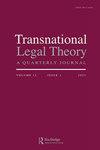技术转让与气候变化:跨国法分析
Q2 Social Sciences
引用次数: 1
摘要
技术转让在气候变化谈判中的作用至关重要。如果技术有助于减缓和适应气候变化,国际社会需要确保充分的创新和技术转让。本文集中讨论旨在确保开发环境上可持续的技术并在需要时提供这些技术的现有法律机制。它对占主导地位的国际和公法框架提出了质疑,转而支持跨国视角,强调技术转让的市场、混合和非市场方法。这一概念框架允许人们关注国家、国际组织和公司如何塑造这一法律领域。最后,文章提出了关于技术转移的讨论反映了一个更广泛的斗争,因为从化石燃料到绿色能源的转变为重新思考人们如何看待技术、知识产权、依赖和国家角色开辟了空间。本文章由计算机程序翻译,如有差异,请以英文原文为准。
Technology transfer and climate change: a transnational law analysis
ABSTRACT The role of technology transfer in climate change negotiations is vital. If technology is to help mitigate and adapt to climate change, the international community needs to ensure sufficient innovation and technology transfer. This article concentrates on the existing legal mechanisms that seek to ensure environmentally sustainable technologies are developed and available where needed. It problematises dominant international and public law frameworks, favouring instead a transnational lens that highlights the market, hybrid and non-market approaches to technology transfer. This conceptual framework allows one to focus on how states, international organisations and corporations shape this area of the law. Ultimately, the article presents the claim that discussions about technology transfer reflect a broader struggle, as the shift from fossil fuels to green energy opens up space to reconsider how one thinks about technology, intellectual property rights, dependency, and the role of the state.
求助全文
通过发布文献求助,成功后即可免费获取论文全文。
去求助
来源期刊

Transnational Legal Theory
Social Sciences-Law
CiteScore
2.10
自引率
0.00%
发文量
7
期刊介绍:
The objective of Transnational Legal Theory is to publish high-quality theoretical scholarship that addresses transnational dimensions of law and legal dimensions of transnational fields and activity. Central to Transnational Legal Theory''s mandate is publication of work that explores whether and how transnational contexts, forces and ideations affect debates within existing traditions or schools of legal thought. Similarly, the journal aspires to encourage scholars debating general theories about law to consider the relevance of transnational contexts and dimensions for their work. With respect to particular jurisprudence, the journal welcomes not only submissions that involve theoretical explorations of fields commonly constructed as transnational in nature (such as commercial law, maritime law, or cyberlaw) but also explorations of transnational aspects of fields less commonly understood in this way (for example, criminal law, family law, company law, tort law, evidence law, and so on). Submissions of work exploring process-oriented approaches to law as transnational (from transjurisdictional litigation to delocalized arbitration to multi-level governance) are also encouraged. Equally central to Transnational Legal Theory''s mandate is theoretical work that explores fresh (or revived) understandings of international law and comparative law ''beyond the state'' (and the interstate). The journal has a special interest in submissions that explore the interfaces, intersections, and mutual embeddedness of public international law, private international law, and comparative law, notably in terms of whether such inter-relationships are reshaping these sub-disciplines in directions that are, in important respects, transnational in nature.
 求助内容:
求助内容: 应助结果提醒方式:
应助结果提醒方式:


